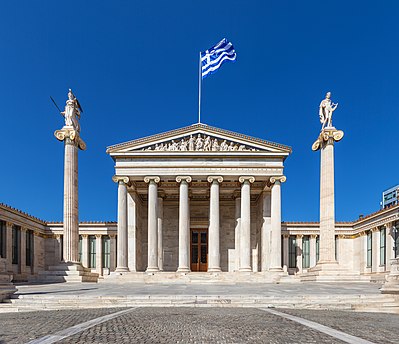Portal:European Union
Introduction
The European Union (EU) is a supranational political and economic union of 27 member states that are located primarily in Europe. The union has a total area of 4,233,255 km2 (1,634,469 sq mi) and an estimated total population of over 448 million. The EU has often been described as a sui generis political entity (without precedent or comparison) combining the characteristics of both a federation and a confederation. Containing 5.8% of the world population in 2020, EU member states generated a nominal gross domestic product (GDP) of around US$16.6 trillion in 2022, constituting approximately one sixth of global nominal GDP. Additionally, all EU states except Bulgaria have a very high Human Development Index according to the United Nations Development Programme. Its cornerstone, the Customs Union, paved the way to establishing an internal single market based on standardised legal framework and legislation that applies in all member states in those matters, and only those matters, where the states have agreed to act as one. EU policies aim to ensure the free movement of people, goods, services and capital within the internal market; enact legislation in justice and home affairs; and maintain common policies on trade, agriculture, fisheries and regional development. Passport controls have been abolished for travel within the Schengen Area. The eurozone is a group composed of the 20 EU member states that have fully implemented the economic and monetary union and use the euro currency. Through the Common Foreign and Security Policy, the union has developed a role in external relations and defence. It maintains permanent diplomatic missions throughout the world and represents itself at the United Nations, the World Trade Organization, the G7 and the G20. Due to its global influence, the European Union has been described by some scholars as an emerging superpower. In 2012, the EU was awarded the Nobel Peace Prize. The United Kingdom became the only member state to leave the EU, in 2020; ten countries are aspiring or negotiating to join it. (Full article...) Selected article.jpg/101px-Tratado_de_Lisboa_13_12_2007_(081).jpg) The Treaty of Lisbon or Lisbon Treaty (initially known as the Reform Treaty) is an international agreement which amends the two treaties which form the constitutional basis of the European Union (EU). The Lisbon Treaty was signed by the EU member states on 13 December 2007, and entered into force on 1 December 2009. It amends the Maastricht Treaty (also known as the Treaty on European Union) and the Treaty establishing the European Community (TEC; also known as the Treaty of Rome). In this process, the Rome Treaty was renamed to the Treaty on the Functioning of the European Union (TFEU). Prominent changes included the move from unanimity to qualified majority voting in several policy areas in the Council of Ministers, a change in calculating such a majority to a new double majority, a more powerful European Parliament forming a bicameral legislature alongside the Council of ministers under the ordinary legislative procedure, a consolidated legal personality for the EU and the creation of a long-term President of the European Council and a High Representative of the Union for Foreign Affairs and Security Policy. The Treaty also made the Union's bill of rights, the Charter of Fundamental Rights, legally binding. Selected picturePhotograph credit: Thomas Wolf The Academy of Athens is Greece's national academy and the highest research establishment in the country. Established on 18 March 1926, it operates under the supervision of the Ministry of Education and Religious Affairs.
This picture shows the main building of the Academy, a neoclassical building between Panepistimiou Street and Akadimias Street in the centre of Athens and one of the city's major landmarks. The building was designed as part of an architectural "trilogy" in 1859 by Danish architect Theophil Hansen, along with the University and the National Library. The Greek neoclassical sculptor Leonidas Drosis sculpted the principal multi-figure pediment sculpture, on the theme of the birth of Athena, based on a design by painter Carl Rahl. Two columns on either side of the portico feature statues of Athena on the left and Apollo on the right, also designed by Drosis.
Did you know?...that France possesses the largest exclusive economic zone (EEZ) in the world? ...that Monaco, San Marino, and Vatican City all mint their own euro coins, with their own national symbols on the back? ...that Turkey's two most famous weightlifters, Naim Suleymanoglu and Halil Mutlu are only two of four weightlifters in the world to have won 3 gold medals in 3 olympics? Selected cityBerlin is the capital city and one of 16 states of Germany. With a population of 3.4 million people, Berlin is Germany's largest city. It is the second most populous city proper in the European Union. Located in northeastern Germany, it is the center of the Berlin-Brandenburg Metropolitan Area, comprising 5 million people from over 190 nations. Geographically embedded in the European Plains, Berlin is influenced by a temperate seasonal climate. Around one third of the city's territory is composed of forests, parks, gardens, rivers and lakes. First documented in the 13th century, Berlin was successively the capital of the Kingdom of Prussia (1701–1918), the German Empire (1871–1918), the Weimar Republic (1919–1933) and the Third Reich (1933–1945). During the 1920s, Berlin was the third largest municipality in the world. After World War II, the city was divided; East Berlin became the capital of East Germany while West Berlin became a de facto West German exclave, surrounded by the Berlin Wall (1961–1989). Following German reunification in 1990, the city regained its status as the capital of all Germany hosting 147 foreign embassies. Berlin is a world city of culture, politics, media, and science. Its economy is primarily based on the service sector, encompassing a diverse range of creative industries, media corporations, congress and convention venues. Berlin serves as a continental hub for air and rail transport, and is one of the most visited tourist destinations in the EU. Significant industries include IT, pharmaceuticals, biomedical engineering, biotechnology, optoelectronics, traffic engineering, and renewable energy. The metropolis is home to renowned universities, research institutes, sporting events, orchestras, museums and personalities. The urban and historical legacy has made it a popular setting for international film productions. The city is recognized for its festivals, diverse architecture, nightlife, contemporary arts, public transportation networks and a high quality of living. Berlin has evolved into a global focal point for young individuals and artists attracted by a liberal lifestyle and modern zeitgeist. General imagesThe following are images from various European Union-related articles on Wikipedia.
TopicsFeatured contentFeatured articles
Featured lists
Featured contentGood articles
CategoriesRelated portalsAssociated WikimediaThe following Wikimedia Foundation sister projects provide more on this subject:
Discover Wikipedia using portals |























_population_pyramid_in_2023_(2).svg/120px-EU_27_(from_2020)_population_pyramid_in_2023_(2).svg.png)


.jpg/80px-Ursula_von_der_Leyen_(49468709252).jpg)







.jpg/86px-José_Manuel_Barroso_(cropped).jpg)




.jpg/85px-Boris_Johnson_official_portrait_(cropped).jpg)
_Hearing_of_Josep_Borrell%2C_High_Representative_Vice_President-designate%2C_A_stronger_Europe_in_the_World_(48859228793)_(cropped).jpg/90px-(Josep_Borrell)_Hearing_of_Josep_Borrell%2C_High_Representative_Vice_President-designate%2C_A_stronger_Europe_in_the_World_(48859228793)_(cropped).jpg)























